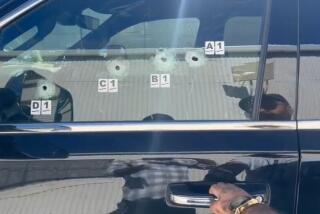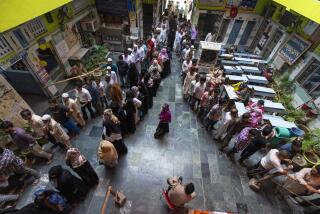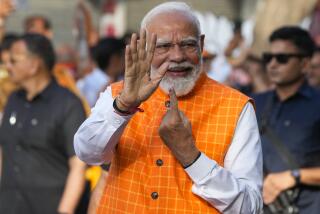Few Defy Sikhs to Vote in Punjab : India: The 25% turnout clouds New Delhi’s hopes of ending the anarchy and restoring the elected government.
- Share via
KARHUAN, India — Devinder Singh, 22, and unemployed, sentenced himself to death Wednesday.
He voted.
Defying a wave of popular cynicism that turned Wednesday’s crucial election in India’s strategic, war-torn Punjab state into little more than a mockery of democracy, Singh placed himself at the top of a rebel hit list--a vow by secessionist Sikh militants to kill the first five voters at each of the state’s 14,659 polling stations.
But the young Sikh stalwart of a small political party that chose to defy the threats appeared unfazed when asked whether he was afraid to be the first voter in this isolated, rebel-infested region of the state early Wednesday morning.
“Afraid? Why?” Singh asked flatly. “People get killed here traveling in buses. People get killed in marketplaces every day. People get killed just walking outside. So I’ll get killed voting.”
Not everyone was so brave in a state where more than 5,800 people were killed last year in the decade-old battle by Sikhs to wrest Punjab from Indian control and make it a separate Sikh nation. Fear and resignation kept millions more voters away from the polls Wednesday than inside them.
Federal authorities in New Delhi were so determined to stage the election that they deployed more than 250,000 Indian soldiers and paramilitary combat forces throughout Punjab. But when the voting ended, it was clear that the government had largely failed to replace Punjab’s anarchy and unchallenged police rule with the first popularly elected government in five years.
Officially, federal officials heralded the voting as a breakthrough, as it was largely free of violence. Only a handful of civilians were killed; only a few dozen were wounded in isolated election day bombings and shootings outside polling booths after an abbreviated 12-day campaign in which each candidate was allotted more than 30 armed guards.
But most analysts and observers said the Sikh rebels apparently had decided they did not need to repeat the murder spree that forced cancellation of last year’s election. Such revenge killings, they said, would come later. And their mere threat would ensure victory to their successful election boycott.
Indeed, voter turnout was among the lowest in the history of a nation that bills itself as the world’s most populous democracy. Fewer than 25% of Punjab’s 13 million voters went to the polls, in contrast to the usual 70% turnout. In hundreds of villages where the militants are strongest, not a single voter entered the booths during the nine hours they were open.
Election officials, escorted and heavily guarded by police and paramilitary forces, sat idle. Some read. Others slept. “We’re just sitting here, killing flies,” one said.
Just down the road from the polling station in the village of Baddowal, a group of Sikh farmers gathered around two visiting journalists to explain the phenomenon.
“Here, we are not afraid of anybody. They (the rebels) don’t come to us for scaring us. We are willingly not going for poll,” said Harcharan Singh, an elderly Sikh supporter of the rebel groups that had ordered the boycott and pressured the most popular Sikh political parties into joining it.
His brother, Gurmeet, said: “Where is the usefulness of this poll? The people standing (for office) are not known to us. It’s only to exploit the people. . . . The government needs Parliament seats in New Delhi. So, it is to win more parliamentary seats and strengthen their government that they are doing this . . . And they want to show the . . . world that they are very democratic types.”
Federal officials said that it was to break Punjab’s pattern of massacres and terror by rebels and police that they pushed so hard for Punjab’s first state election since New Delhi unilaterally dissolved the last elected government in May, 1987.
“People here had become cynical--especially after the last-minute cancellation of the last elections in June--that there may never be elections in Punjab,” explained Tijendra Khanna, the state’s chief secretary and top bureaucrat who has functioned as Punjab’s ruler for several years. “So, first the poll is a reassurance to the people in general.”
Khanna conceded that the boycott by the Sikh’s Akali Dal party--which governed Punjab through an elected assembly until May, 1985, and retains the support of most voters in the Sikh-majority state--hurt the poll’s credibility. “It’s really like hosting a dinner and inviting everyone to participate. If some of them choose to sulk and stay away, of course part of the satisfaction of hosting that feast isn’t there,” he said.
So insistent were Khanna and national leaders in New Delhi that the election be held that they deployed the Indian army several months ago to curb the state’s soaring murder rate and jailed boycotting Akali Dal leaders. And they censored all advertisements supporting the Sikhs’ boycott.
But, reflecting a deeper belief among top officials in Punjab that the state may not be ready for elections, Khanna said, “Democracy is meant for a civilized, peaceful society.. . . The gun has no place in a democracy, certainly not for sorting out problems that should be solved through debate.”
More to Read
Sign up for Essential California
The most important California stories and recommendations in your inbox every morning.
You may occasionally receive promotional content from the Los Angeles Times.













